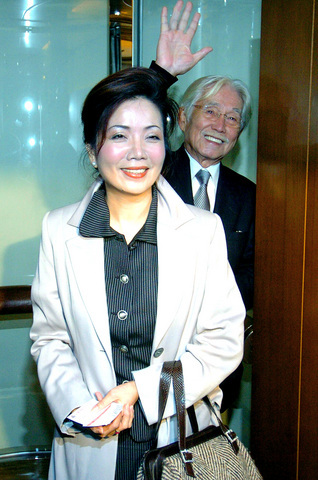Two pro-Taiwan-independence senior presidential advisers, Koo Kwang-ming (
Other than Koo and Wu, National Policy Advisers Ng Chiau-tong (
The agreement was made during Thursday's "Bian-Soong" meeting, which included Chen's reiteration that he would not promote Taiwan's independence or change the country's official name during his term in office.

PHOTO: GEORGE TSORNG, TAIPEI TIMES
The president paid too high a price in issuing the statement with Soong, Ng said. Ng is also the chairman of World United Formosans for Independence.
At the news conference yesterday held to announce his decision to resign, Koo said he found it "unforgivable" for Chen to ink an accord with Soong. Koo also branded it "inappropriate" for "a head of a state to sign a joint statement with the chairman of a civil organization."
Koo criticized Chen for what he perceived as a vacillating attitude toward constitutional reform.
"It is important for a leader to offer a sense of trustworthiness to people," Koo said. "I really don't know what to do with him [Chen]."
Koo also took a swipe at the Democratic Progressive Party (DPP), saying that "There are many talented people in the party, but when a leader has made such a wrongheaded decision, there were no objections from the party about the issue."
Koo said he would also cancel his DPP membership, and that leaving the DPP did not mean he was forsaking his ideals.
"I will still dedicate myself to the promotion of writing a new constitution and changing the nation's official name to Taiwan," Koo said.
"I will watch what President Chen does, and if he is willing to turn back, we are still partners," he said.
Chen has more than 100 advisers from different political backgrounds.
During a gathering with the press yesterday afternoon, Vice President Annette Lu (
Chen Wen-tsung (陳文宗), director-general of the Presidential Office's Department of Public Affairs, yesterday said that the president has already instructed Presidential Secretary-General Yu Shyi-kun to personally visit these advisers to try to dissuade them from resigning.
DPP Chairman Su Tseng-chang (
However, Koo did not change his mind, and insisted on resigning.
But Koo said that he would retain his DPP membership for a time to see whether the DPP will "correct" its line.
Additional reporting by Jewel Huang

DAREDEVIL: Honnold said it had always been a dream of his to climb Taipei 101, while a Netflix producer said the skyscraper was ‘a real icon of this country’ US climber Alex Honnold yesterday took on Taiwan’s tallest building, becoming the first person to scale Taipei 101 without a rope, harness or safety net. Hundreds of spectators gathered at the base of the 101-story skyscraper to watch Honnold, 40, embark on his daredevil feat, which was also broadcast live on Netflix. Dressed in a red T-shirt and yellow custom-made climbing shoes, Honnold swiftly moved up the southeast face of the glass and steel building. At one point, he stepped onto a platform midway up to wave down at fans and onlookers who were taking photos. People watching from inside

A Vietnamese migrant worker yesterday won NT$12 million (US$379,627) on a Lunar New Year scratch card in Kaohsiung as part of Taiwan Lottery Co’s (台灣彩券) “NT$12 Million Grand Fortune” (1200萬大吉利) game. The man was the first top-prize winner of the new game launched on Jan. 6 to mark the Lunar New Year. Three Vietnamese migrant workers visited a Taiwan Lottery shop on Xinyue Street in Kaohsiung’s Gangshan District (崗山), a store representative said. The player bought multiple tickets and, after winning nothing, held the final lottery ticket in one hand and rubbed the store’s statue of the Maitreya Buddha’s belly with the other,

‘NATO-PLUS’: ‘Our strategic partners in the Indo-Pacific are facing increasing aggression by the Chinese Communist Party,’ US Representative Rob Wittman said The US House of Representatives on Monday released its version of the Consolidated Appropriations Act, which includes US$1.15 billion to support security cooperation with Taiwan. The omnibus act, covering US$1.2 trillion of spending, allocates US$1 billion for the Taiwan Security Cooperation Initiative, as well as US$150 million for the replacement of defense articles and reimbursement of defense services provided to Taiwan. The fund allocations were based on the US National Defense Authorization Act for fiscal 2026 that was passed by the US Congress last month and authorized up to US$1 billion to the US Defense Security Cooperation Agency in support of the

‘COMMITTED TO DETERRENCE’: Washington would stand by its allies, but it can only help as much as countries help themselves, Raymond Greene said The US is committed to deterrence in the first island chain, but it should not bear the burden alone, as “freedom is not free,” American Institute in Taiwan Director Raymond Greene said in a speech at the Institute for National Defense and Security Research’s “Strengthening Resilience: Defense as the Engine of Development” seminar in Taipei yesterday. In the speech, titled “Investing Together and a Secure and Prosperous Future,” Greene highlighted the contributions of US President Donald Trump’s administration to Taiwan’s defense efforts, including the establishment of supply chains for drones and autonomous systems, offers of security assistance and the expansion of